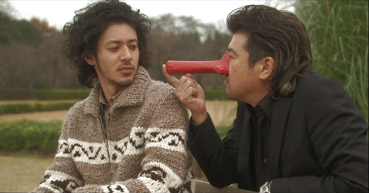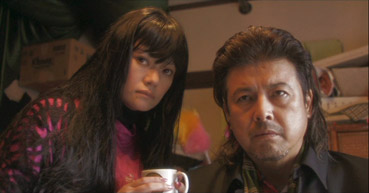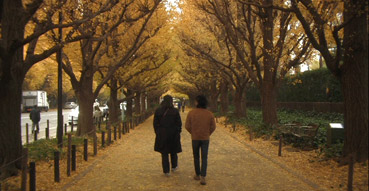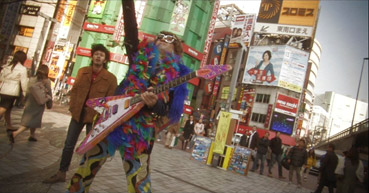| |
"Happiness creeps into you so quietly that you don't notice... but misfortune arrives very abruptly." |
| |
Takemura muses on the cards dealt by life |
|
"Half the memorable places in Tokyo have become parking lots." |
|
Fukuhara on the demolition of Takemura's childhood home |
Socially isolated law student Takemura is in debt to a loan shark for 840,000 yen (that's about £6,700 in UK money before you get too alarmed), a problem that receives an urgency upgrade when burly debt collector Fukuhara storms into his flat, stuffs a sock in his mouth, and gives him three days to pay up or face the doubtless unpleasant consequences. What's a penniless boy to do? After being approached by two cheerful schoolgirls asking for donations to help Afghan children and wondering just how much cash they have in their collection boxes, Takemura finds a key to a nearby station locker, inside of which sits the sort of bag in which movie criminals like to hide bank robbery spoils. In keeping with his current run of luck, this one contains a small collection of Daruma dolls of little financial value and a broken-off goblin's nose.
Takemura is just contemplating this latest disappointment when Fukuhara reappears with a proposal that will not only cancel his debt, but net him another million yen. Having committed an initially unspecified crime,* Fukuhara has decided to hand himself in at the police headquarters in Kasumigaseki ("Might as well go to the best") and has chosen to walk there, a journey that could take anything from three days to a month, depending on how he feels and what route he elects to take. What he's looking for is a companion to keep loneliness at bay, but if Takemura accepts then there's no backing out, however long it might take. The younger man reluctantly agrees – what choice does he really have? – and the pair begin a trek on which their early mutual antagonism is set to gradually mellow.

What is essentially a road movie built around the age-old concept of the mismatched pair who become friends over time is given a distinctive flavour by the nature of the journey – in a city as busy and diverse as Tokyo, you're always going to see more travelling on foot than you would by car – and the offbeat collection of characters they meet on en route. Almost everyone they run into is quirky in some way, which litters their travels with memorable encounters: the female restaurant owner who loudly argues with her bullying adult son and chases him into the street while the two men look on and continue their meal; the ageing clock store owner who chases them across town and floors Fukuhara with an elegantly executed karate kick; the older cosplay fan ("There's no age limit for cosplay!") dressed as the once-popular Japanese TV superhero Gekko Kamen and who may be the real deal; the "Shinjuku Mum" clairvoyant who runs a popular street stall offering an "expert opinion on anything"; the flamboyantly glam-dressed guitarist who walks the city streets thrashing out tunes to no-one in particular and quits only when faced with two baton-tapping policemen. Even the background is peppered with offbeat detail, established early in a title sequence walk through a lively shopping area, where the two men pass everything from excitable schoolgirls to businessmen making phone calls whilst riding on unicycles.
This whimsical approach risks pandering to the western cliché of Japanese eccentricity, one that casts the whole country as odd for daring to differ from our own culturally narrow definition of what constitutes normality. But the insider's view presented here by director Miki Satoshi (and, we can presume, source novel author Fujita Yoshinaga) displays a gentle affection for the unusual elements of everyday life, grounding even the wilder exaggerations in a reality that anyone who has spent time in Japan should recognise as true. Some of this is clearly specific to the locale – a discussion on a colloquial alternative word for walks, or the way female office workers hold their wallets aloft – while others will require a passing knowledge of Japanese culture to appreciate in full. But so dense is this background detail, so deft Satoshi's handling and so enjoyable the performances that you still find yourself smiling and convinced that you understood every reference.

Such attention to character and background enriches and fragments the ongoing conversation between Fukuhara and Takemura, itself an engaging blend of opinion, social observation and mutual self-discovery that is repeatedly sidetracked by the people they meet, narrative disruptions that open small windows into aspects of the lead characters' lives. There's cosplay enthusiast Naomi, whom the younger Takemura once doted on but abandoned after his attempt to make her a fake Lacoste shirt fell apart in her hands. There's the furious tatami mat salesman, whose wife Takemura's father once seduced and who is still looking for payback. And there's nutball artist Kaburagi, who lives in self-imposed squalor, paints pictures of WW2 bombing raids, and glides across the ground like an earthbound spirit. Most revealing of all is Makiko, who once posed as Fukuhara's wife at a wedding for which she and he were hired as fake relatives,** and who has continued the deception by assuring her child-like but wildly enthusiastic teenage niece Fufumi that Fukuhara is her real husband and that he will one day return from his work as a ship's captain. Even she has her eccentricities, repeatedly going back for just one last thing when leaving the house, and describing Fukuhara as someone whose "anus must be missing a crease" as if the phrase were well known and in everyday use. It's in Makiko and Fufumi's company that the father-son relationship that has unobtrusively been developing between Fukuhara and Takemura is brought subtly to a head, as the latter sheds quiet tears the prospect of his friend's departure and briefly enjoys a taste of faux-familial stability that he was denied in childhood by his real parents' absence.
There's more than a whiff of Kitano Takeshi about Satoshi's approach to character and quirky comedy and the manner in which the story unfolds, the main reference point being the 1999 Kikujiro no natsu, another tale of a brash father figure and a surrogate son who gradually bond during the course of a journey peppered with offbeat encounters. But Adrift in Tokyo is still every inch the work of the man who brought us the brilliantly titled and equally quirky Turtles are Surprisingly Fast Swimmers [Kame wa igai to hayaku oyogu] in 2005, and is every bit as confidently handled and deliciously detailed as Kitano's quietly magical film. The performances are a delight, with lead players Miura Tomokazu and Odagiri Jô bouncing off each other wonderfully and inhabiting the roles of Fukuhara and Takemura like comfortable second skins, and splendid support is provided by the energetic Koizumi Kyôko as the upbeat Makiko, the hilarious Yoshitaka Yuriko as the wildly excitable Fufumi, and an appropriately creepy turn from Reona Hirota as the oddball Kaburagi. There's even a cameo role for veteran actor Kishibe Ittoku (Zatoichi, Survive Style 5+), who gets the rare chance to play, well, veteran actor Kishibe Ittoku.

Part road movie, part buddy drama and part semi-surrealistic observational comedy, what really strikes you about Adrift in Tokyo is not just that each element works as well as it does, but that they so harmoniously gel. Even a comical sub-plot involving three office workers who are repeatedly distracted from a task that unknowingly risks upsetting Fukuhara's plan feels organically melded to the main story, in part because the three are as energetically daffy as anyone that Fukuhara and Takemura encounter en route (stay with the end credits for a comical postscript to one element of their story). The result may well be Miki's most accomplished film yet, an involving, touching, frequently funny and richly textured work, and one of the most inventive and unashamedly enjoyable Japanese films to hit the UK in recent years.
That Adrift in Tokyo was shot on HD is not hard to detect if you know what to look for, but that's not meant as a criticism, as the format has its own aesthetic and in the right hands can produce very attractive results. What does surprise is that it was shot on the Canon XL-H1, a relatively lightweight camcorder stationed at the lower end of the professional market (you can buy one new for under £6,000) and that records in 1080i rather than the 4K resolution of the Red One, the current industry favourite. I've not seen the film on a cinema screen, but on my 42" plasma it looks damned good, displaying an impressive level of detail for a standard definition disc and boasting well balanced contrast, with no greying out of black in the darker scenes and no obvious loss of picture information to post-production digital tinkering. The colour scheme, pleasingly, favours naturalism over annoying tints, and is quite vibrant when required (the costumes and lights of the cosplay hall being a good example). Presumably to avoid standards conversion issues, the disc is NTSC rather than PAL, but this shouldn't cause any problems for modern televisions or disc players. All in all, a fine job.

The are no problems with the Dolby 2.0 Japanese language stereo soundtrack, which although not exactly a standard setter is cleanly recorded and mixed, and handles the music without distortion or huge jumps in volume. The stereo separation is so subtle you'll probably need headphones to hear it, and even then it appears largely confined to the music. The removable English subtitles are clear and gramatically sound.
Making of (70:45)
A lengthy making-of video that follows the shooting of scenes in story-chronological order. There's little variance in tone, which will be fine for those of us who enjoy watching the filmmaking process, but may well feel a little repetitive for those not as enthralled by this aspect. Several members of the supporting cast give brief and polite interviews about their work on the film, but there's no verbal input from the lead actors or any of the crew. Given that this chronicles a good part of the shoot, including the final scene, it's worth avoiding until after you've watched the main feature.
Trailer (1:56)
A very Japanese trailer, complete with cutesy graphics and the proclamation that this is a "heart-warming story of two men trudging along together."
There are also the usual trailers for other Third Window DVD releases and a couple of web links.
A witty and enchantingly low-key and character led comedy-drama, the sort of film that you can't help thinking that Kitano Takeshi would watch and wish that he had made and starred in, but that stands comfortably on its own merits and the considerable storytelling skills and attention to detail of its talented young director. Third Window Films have delivered a fine transfer here, and while there are only two extra features, if you like behind-the-scenes footage then one of them is substantial. Warmly recommended.
* The crime in question is revealed quite early on in the journey, so if you do read about it elsewhere it doesn't count as a serious spoiler.
** This is not as fanciful as it may sound. In a country where there is real shame in losing face in the company of others, there are a number of companies from which prospective brides or grooms can hire fake friends or relatives to impress their new families, often without them ever becoming aware of the truth. You can read more about it here (or could before the paywall was thrown up).
The Japanese convention of surname first has been used for all Japanese names in this review.
|